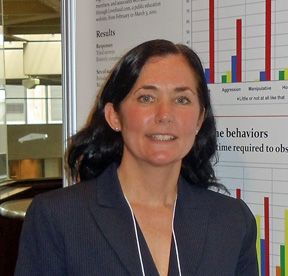 By Liane J. Leedom, M.D.
By Liane J. Leedom, M.D.
Imagine loving someone, having children with that person, and then realizing that you’ve gotten yourself involved in an abusive relationship.
Imagine suspecting that your partner, the mother or father of your children, has a personality disorder and then hearing that personality disorders are highly genetic.
If you’re a therapist, imagine this person is your client. What do you do?
I believe we can and should intervene in the lives of children who are at risk of developing externalizing disorders, such as ADHD, conduct disorder, oppositional defiant disorder, and substance use disorders. If we do, we may be able to prevent these children from developing personality disorders as adults.
When we study large numbers of people affected by externalizing disorders, and personality disorders in particular, we see that about 50 percent of the risk for these disorders is genetic. That means the environment children grow up in, including their interactions with parents, siblings and peers, also strongly influences the development of disorder.
With the right environmental influences, the genetic risk may be mitigated. Most programs to support victims of partner abuse do not address the issue of genetic risk. If we start early, and if we put a little energy into helping children, both the child and the family can be spared a lot of anguish due to emotional and behavioral problems later on.
By and large, programs that teach parenting skills are good. But for this particular group of children, parenting approaches that emphasize rules, consequences and discipline, may not be the most effective.
Research is finding that internalizing disorders, such as anxiety and depression, relate to the inhibition system of the brain, whereas externalizing disorders relate to the dopamine reward system.
What we want to do with this group of children is to train their brain reward system to respond to positive rewards most importantly a loving family and affection. It’s very difficult to train a child to respond to affection in a good way when you’re punishing the child every five minutes for something the child is doing.
Still, love is not enough. We also have to train the child to enjoy doing things that are productive, like work because life involves work and hobbies, such as music and sports.
I advocate a two-pronged approach, although one of the prongs of my approach has not been thoroughly researched.
I believe in teaching the parents and the children in developmentally appropriate language what genetic risk is about. In the case of externalizing disorders, it involves difficulty with self-control. I think it’s important to teach children, when they show problems with self-control, to identify their issue, and to help them understand that it’s something they can work on.
This teaching has not been well researched, but it is similar to cognitive behavioral therapies that are used for children.
The other part of my approach is teaching parents to interact with their children in a positive way, and to enjoy their children. Now, I understand that this can be difficult when the children have issues with self-control. But we’re focusing on training that reward system, and if there’s no enjoyment, you cannot train the reward system.
I will explain this intervention approach in a four-part series of online webinars:
Overcoming Children’s Genetic Risk for Externalizing Disorders
- Part 1: Externalizing disorders of childhood and adulthood, including ADHD, conduct disorder, antisocial personality disorder and psychopathy
- Part 2: What genetic research says about behavior and the risk of developing externalizing disorders
- Part 3: How the environment, including parenting, siblings and peers, affects the development of externalizing disorders in children
- Part 4: Brain systems, social learning, and using the Inner Triangle to immunize children against externalizing disorders
For more information, visit Lovefraud Continuing Education.
Of course, sometimes the genes express themselves so strongly that no amount of loving parenting can overcome the genetic risk. But if we try, we may be able to save many children from a lifetime of disorder and antisocial behavior. I think the effort is worth it.
Biography:
Liane J. Leedom, M.D., is a psychiatrist and an associate professor of counseling and psychology at the University of Bridgeport. She is author of Just Like His Father? A Guide to Overcoming Your Child’s Genetic Connection to Antisocial Behavior, Addiction and ADHD, and Women Who Love Psychopaths: Investigating the Relationships of Inevitable Harm. She is also author of multiple peer-reviewed studies, including The Problem of Parental Psychopathy, and Did He Ever Love Me? A Qualitative Study of Life with a Psychopathic Husband.

 What teachers need to know about sociopaths and abusive dating
What teachers need to know about sociopaths and abusive dating